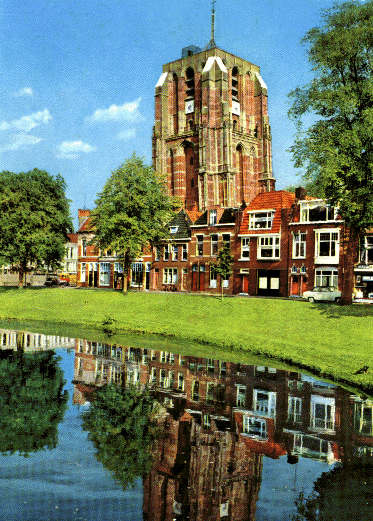By imperial decree of August 18, 1811, each habitant was obliged to declare a fixed familyname. Each familyhead had to go the "marie" (municipal court) to declare the chosen surname. Even those who had already a familyname had to go there to confirm it. However, it appears that not everybody complied with this order.
The "Ryksargyf" (State Archives for Friesland in Leeuwarden) has archived all those familynames, implementing Napoleon's decree on the familynames. Besides the adopted surname, each record contains also the name and the age of children, grand- and greatgrandchildren living with the father. Those records have now been made available on the Internet as a databank for research by
Ryksargyf - Tresoar
.(Click on WELKOM, then on Geneaology.)Sometimes the record mentions also some other particulars.
2. Data concerning Boekema’s.
Since 1998, it is possible to obtain also data from state archives via GenLias which forwards more and more civil service records (marriage and deaths) of different provinces (Friesland, Drenthe, Utrecht, Noord-Brabant, etc.). Gerda Boekema (branch of Abel Gerrits) was the first one who brought this source to my atttention.
The data banks of it Ryksargyf as wel of GenLias and others likewise, for instance FamilySearch of the Latter Day Saints, are not always exact. For example, GenLias mentions the death record of
Antje Linzes Boekema
She was 23 years old, and married. She died on September 1846, county Opsterland. Because we are here in the same municipality where Baate Durks Boekema lived, we first guessed a link between the two families. But as a matter of fact, the father of Antje turned to be a Linze Bokkema. Because the data available on Internet are becoming richer all the time, many of our loose ends have been brought to their proper place. You will find the different family trees of Boekema families by going back to the table of contents of my website.
In 1811 began, as we have seen, the civil status. It works with alphabetical namelists for every 10 years and for each municipality and refers to birth-, marriage - and death certificates of the civil register. However if we want to obtain primary genealogical data from before the French era, we have to turn ourselves first of all to the churchrecords, the ecclesiastical forerunners of the civil records: the so called DTB's (Doop(baptism)-, Trouw (marriage)- and Begraaf (burial) records. When the civil registers were started the churches were obliged to bring their DTB's or copies of it to the municipal registry. They were used there as an information source for the civil servant. At the end of the 19th century, these records were transferred to the State archives. These archives in turn have lent the records of a certain number of municipalities to the municipal and regional arhcives. Many of these are now available for consultation on microfilm at the Centraal Bureau voor Genealogie in The Hague.
Because the DTB-registers are not always complete, other sources have to be consulted also of course. I skip here details but it seems that the book of P. Nieuwland. Gids voor genealogisch en biografisch onderzoek in Friesland (Ljouwert/Leeuwarden 1988) offers valuable help. It is on sale at the Ryksargyf. I will list here, rather as an example, some of the muncipal records which are available and probably of interest for our research. Because this research has to be done in Dutch I do not translate these data.
434. Geboorte-trouw- en lidmatenboek, 1732-1850. Warga 435. We know that Boekema's have lived in Tietjerksteradeel, Opsterland, Leeuwarderadeel and Rauwerderhem as well. So still a lot of research can be done. WE should not forget about the Mormons or "The Church of Jesus Christ of Latter-day Saints"either. Their famous FAMILY HISTORY CENTERS are open for genealogical research and could also help us.The site I mention here before is just one of them.
3. Sources for further research.
Alfabetischhe naamlijst: DTB nrs. 435a en 435b.
Alfabetische naamlijst: DTB nrs. 435a en 435b.
Alfabetische naam lijst geborenen: DTB nr. 435c.
Alfabetische naamlijst: DTB nr. 435c.
Alfabetische naamlijst huwelijken: DTB nrs. 435a en 435b.
Alfabetische naamlijst lidmaten: DTB nr. 435e.
N .B . Huwelijken van 1715-1811 en lidmaten van 1737-1771 en 1820-1850.
Alfabetische naamlijst huwelijken: DTB nrs. 435a en 435b.
Alfabetische naamlijst dopen: DTB: nr. 435c.
Alfabetische naamlijst lidmaten: DTB nr. 435e.
N.B. Geboorten van 1732-1813, huwelijken van 1796-1810 en lidmaten van 1797-1850 (met doopdata van 1786 af).
Alfabetische naamlijst dopen: DTB nr. 435c.
N.B. Dopen van 1696-1811, huwelijken van 1719-1734, 1751-1862, en overledenen van 1750-1770, 1791-1806, 1815-1862. ![]()
 Return to Table of Contents
Return to Table of Contents
This page hosted by
![]()
Get your own Free Home Page
